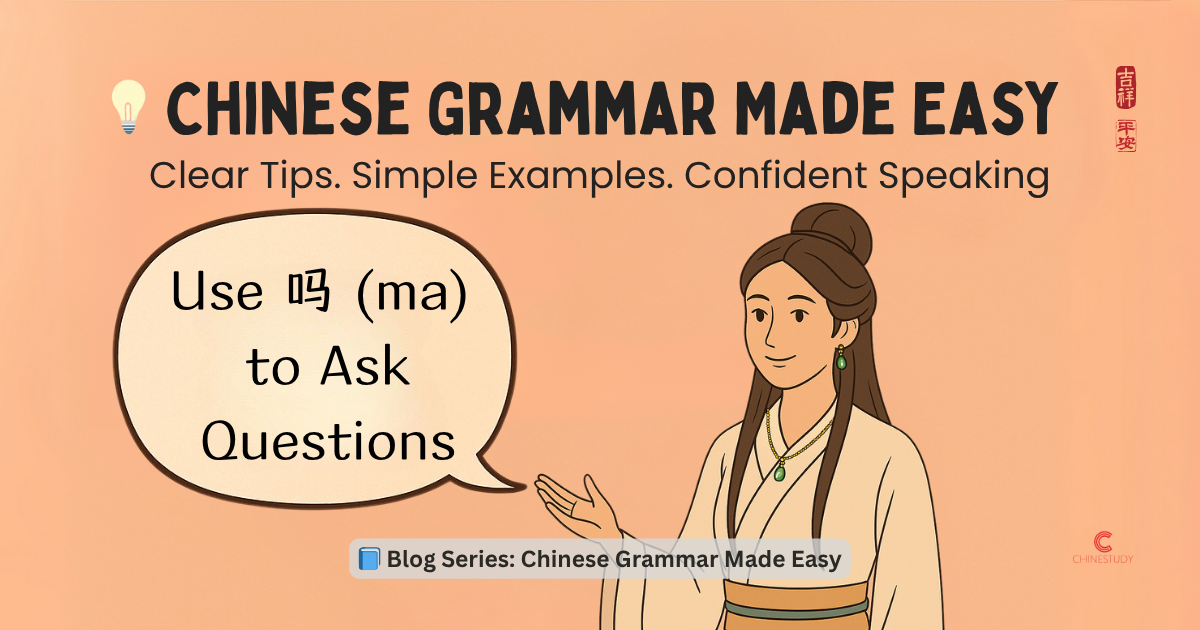📝 How to Use 吗 (ma) in Chinese to Ask Questions Clearly

In English, we ask questions by changing the word order or adding a helping word:
- “Are you busy?”
- “Can you swim?”
- “Do you like coffee?”
In Chinese, you can use a simple question particle to do the same job!
That little word is: 吗 (ma).
Let me show you how!
📚 What Is 吗 (ma)?
吗 (ma) is a question particle.
👉 It goes at the end of a statement
👉 It turns a statement into a yes/no question
👉 It does not change word order
Think of it like a friendly question mark.
🧩 How It Works
Let’s take a normal sentence:
你喜欢咖啡。
(Nǐ xǐ huān kā fēi.)
→ You like coffee.
📝 Now just add 吗 (ma):
你喜欢咖啡吗?
(Nǐ xǐ huān kā fēi ma?)
→ Do you like coffee?
Same word order. Just add 吗!
💡 Examples
1.
你忙。 (Nǐ máng.)
→ You’re busy.
👉🏼 你忙吗?(Nǐ máng ma?)
→ Are you busy?
2.
他是老师。(Tā shì lǎo shī.)
→ He is a teacher.
👉🏼 他是老师吗?(Tā shì lǎo shī ma?)
→ Is he a teacher?
3.
你会说中文。
(Nǐ huì shuō zhōng wén.)
→ You can speak Chinese.
👉🏼 你会说中文吗?
(Nǐ huì shuō zhōng wén ma?)
→ Can you speak Chinese?
🔔 Notice:
- 吗 (ma) can only be used for yes/no questions
- Don’t use it for open questions like “why,” “when,” or “how”
❌ Wrong: 你为什么喜欢他吗?
✅ Correct: 你为什么喜欢他? (Why do you like him?)
📝 Practice Time!
Turn these into questions by adding 吗 (ma):
1️⃣ 你是学生。
(Nǐ shì xuéshēng.)
2️⃣ 她会游泳。
(Tā huì yóuyǒng.)
3️⃣ 他在家。
(Tā zài jiā.)
👉 Answers:
1.
你是学生吗?
(Nǐ shì xuéshēng ma?)
Are you a student?
2.
她会游泳吗?
(Tā huì yóuyǒng ma?)
(Can she swim?)
3.
他在家吗?
(Tā zài jiā ma?)
Is he at home?
⚠️ Common Mistake
Don’t move the word order!
Just add 吗 at the end. That’s it.
👉🏼 Are you a student?
❌ Wrong: 是你学生吗?
✅ Correct: 你是学生吗?
🎯 Quick Tip to Remember
Think of 吗 (ma) as a soft question mark
It doesn’t make the sentence stronger — just turns it into a polite question.
🚀 Your Turn! Try It in Real Life
Write 3 simple Chinese questions using 吗 (ma).
Here are some ideas:
- “Are you busy?”
- “Do you like tea?”
- “Is this your friend?”
Then say them out loud and try using them in daily conversations.
🌟 Want step-by-step guidance?
👉 Check out my course: Mandarin Chinese Grammar Masterclass for Beginners.
👉 Explore the full blog series: Chinese Grammar Made Easy.
Thank you for subscribing!
Have a great day!